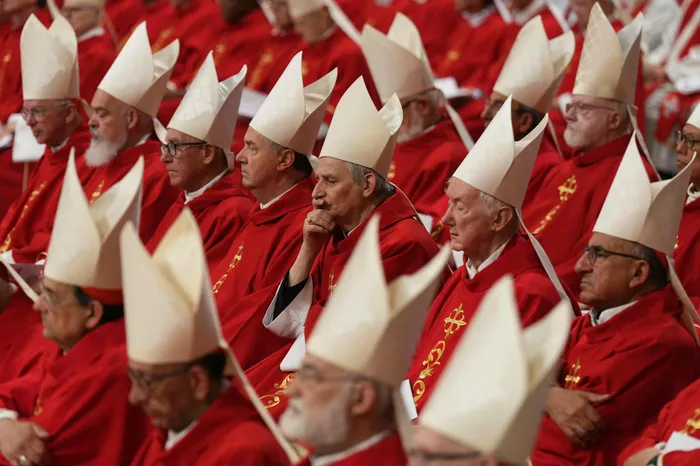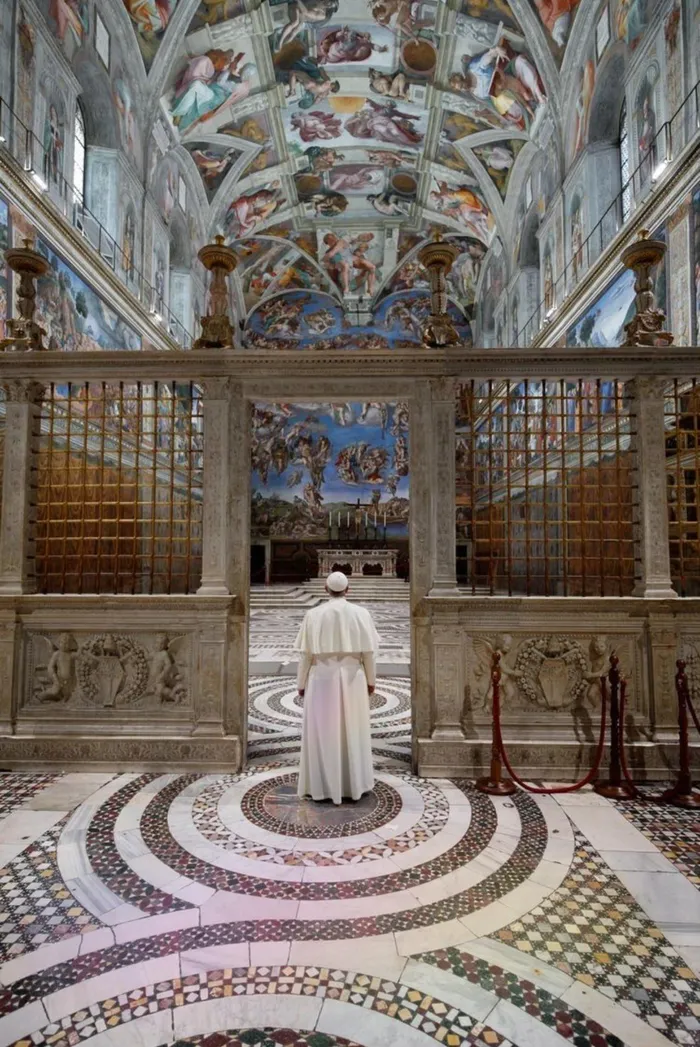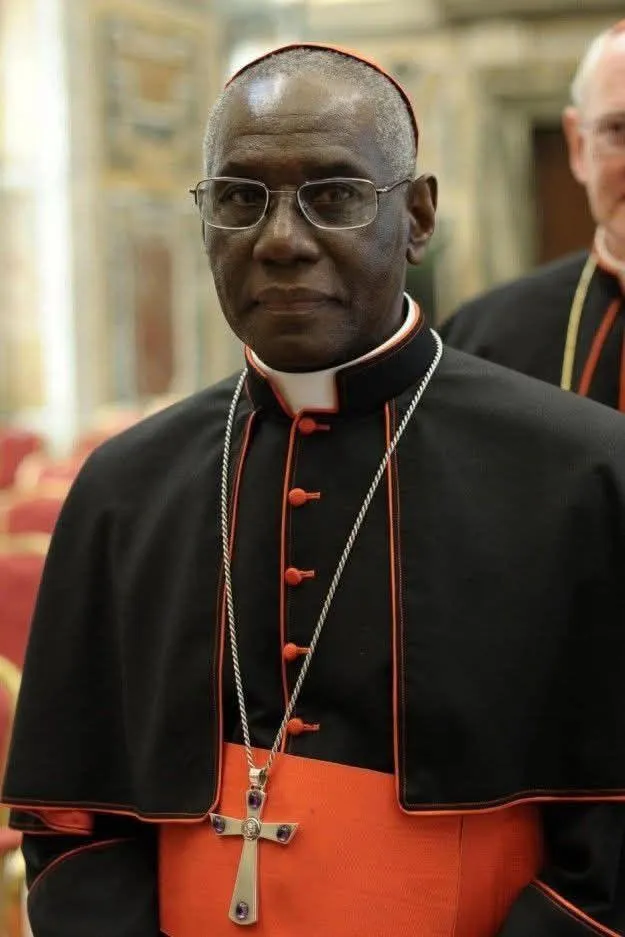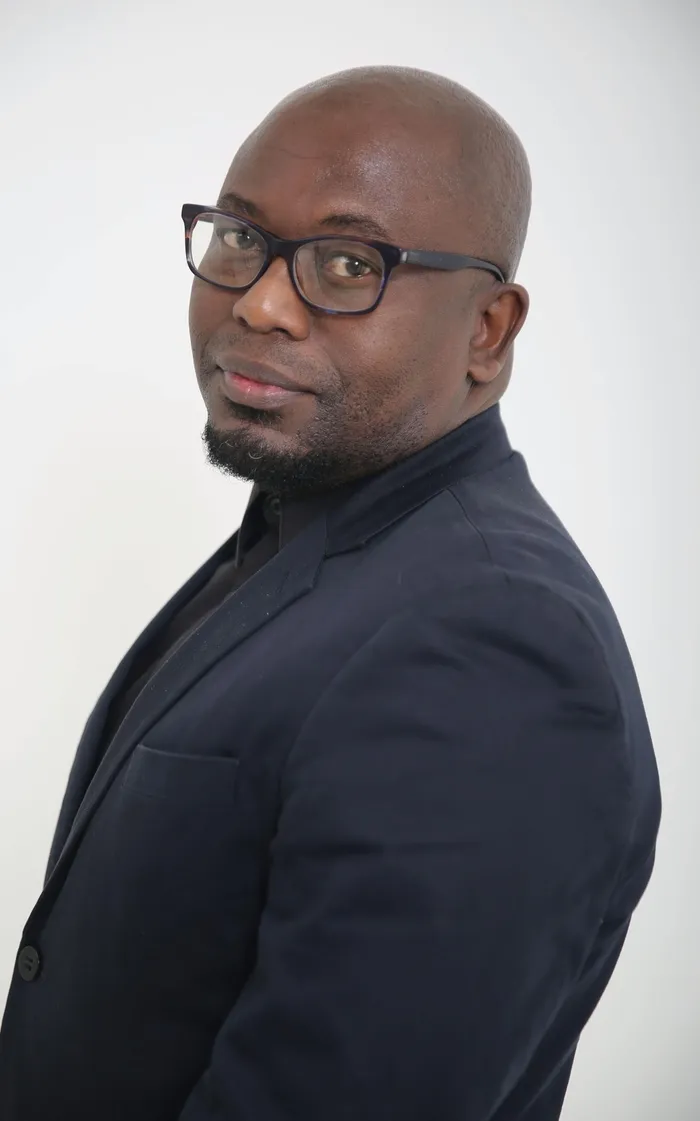Smoke signals: Why a black pope may not necessarily be progressive
During the seating there's no communication with the outside world on the proceedings, except for the smoke signals from the burnt ballot papers. Black smoke signals a new round of voting is required. White smoke signals a new pope has been successfully elected. So when the white smoke billows from the Sistine Chapel chimneys to announce a new pope, the important thing is whether the new pope is either progressive or conservative. Not black or white, like the smoke signals.

Catholic cardinals have set May 7 as the starting date for the conclave to elect a successor to Pope Francis
Image: Dimitar DILKOFF / AFP
THE Vatican City has announced next Wednesday as the day of the papal conclave after the passing of Pope Francis on Easter Monday and who was buried last Saturday.
Because of his revolutionary approach, Pope Francis has been referred to as the most progressive pope of all time. As the first Latin American pope, Francis was working to get the church to have tough talks about issues like women's ordination and acceptance of LGBQTI Catholics. More cardinals from outside of Europe joined the conclave during the pontificate of Pope Francis.
There has been a compelling case for a black pope to succeed him since his death. The subject of a black pope isn't as progressive as some who make this argument would like to think, in my opinion, as a proud Zulu man who actively practices his culture, customs, and traditions and a member of the Roman Catholic Church.

The death of Pope Francis has brought significant changes to the Vatican, with the immediate closure of the Sistine Chapel to the public
Image: X/@CultureExploreX
Allow me to stray a bit. St Wendolins, Mariannhill, a township with close ties to the Catholic Church, is where I grew up. A Catholic priest was the first white person I saw. The Catholic Church held the land at St Wendolins, giving its citizens land rights that went against the apartheid regime's land policy for black people.
I was born in St Mary's Hospital in Mariannhill, a hospital built by a group of Trappist monks in 1927, eight years before my late father was born. My father studied to become a Catholic priest but, for some reason, couldn't sit for two successive final exams due to mysterious health issues until someone in the church asked him to go back home on a soul-searching exercise.
After that, he began teaching in Roman Catholic schools throughout the province and translating some church publications from Latin, English, and German into Zulu. He then joined UmAfrika, the now-defunct alternative press owned by the Mariannhill Mission Institute, as a journalist, short story writer, and satirist columnist. He might never have met my mother, and I very likely wouldn't be here since Catholic priests are required to take an oath of celibacy.

Cardinal Robert Sarah from Guinea in West Africa is a conservative who has accused the West of abandoning its Christian roots and has described the massive deportation as a form of 'self-destruction'.
Image: Facebook
Because it may reflect diversity and encourage representation, the case for a black pope may appear progressive on many levels. If a black pope emerges from next week's papal conclave, some believe it would represent Catholicism around the world.
Those who advocate for a black pope are correct when they assert that the papacy has historically been linked to Western and European leadership. There is evidence that popes of the first millennium were either of African heritage or born in North Africa, according to scholars who have examined and researched the early church.
The three popes were Pope Gelasius I (492–496), Pope Miltiades (311–314), and Pope Victor I (189–199).
The Global South, particularly Africa and Latin America, the third-largest church regions, would be sympathetic to the choice of a black pope. The church implemented inculturation after realising that Latin America and Africa were where it was growing the fastest. This allowed Africans and Latin Americans to continue their traditions without feeling excluded from the gospel. The church became more flexible as a result.
When someone passes away, Zulus perform a ritual in which they retrieve the deceased's spirit using a branch of a special herb known as ihlahla lomlahlankosi or ihlahla lomphafa. The person holding the branch communicates with the deceased's spirit through the special herb and is prohibited from speaking to anyone else until they have reached their destination.
This is done until the burial of the deceased, and whatever route the funeral procession takes, the one holding the branch communicates with the deceased. The herb is believed to have the power to fetch the spirit of the dead.
When I lost my firstborn son last year, I didn't seek permission to enter the grounds of the parish for my son's Requiem Mass, with ihlahla lomlahlankosi. This shows how diverse and welcoming the church is, despite all the unwarranted criticism it receives on social media for its perceived Eurocentric sensibilities and posture.
This illustrates, on a number of levels, the spiritual function played by church officials, particularly priests and higher. Therefore, it disproves the claim that a leader must be of a certain race in order to set the agenda for diversity and transformation.
The rise of a black cardinal to the papacy is not necessarily progressive, though, as some of the black cardinals who are eligible to be elected as the next pope will demonstrate.
Cardinal Robert Sarah from Guinea in West Africa is a conservative who has accused the West of abandoning its Christian roots and has described the massive deportation as a form of 'self-destruction'.
Cardinal Sarah had numerous clashes with Pope Francis, and many conservatives view him as an anti-woke alternative.
His election will achieve two things: the praise for the church for a groundbreaking election of a black pope and a return to conservatism, which will gain ground lost through Pope Francis' alignment with modern secularism.
Cardinal Sarah released a book in 2020 with retired Pope Benedict, titled "From the Depths of Our Hearts: Priesthood, Celibacy and the Crisis of the Catholic Church", which tore into the idea of allowing married priests to address a priest shortage in the Amazon, which Pope Francis was considering.
The book advocated for the necessity of celibacy among Catholic priests, but retired Pope Benedict was forced to remove his name after it created a scandal and an impression that he wanted to influence papal decisions after his tenure.
The scandal died down after Benedict removed his name, however, retaining his white cassock of the papacy after retiring as a pope, which was tantamount to making him an unofficial "pope emeritus", was always criticised by canon lawyers and theologians who felt he should abandon it, something he eventually acquiesced to.
But it's a book that Cardinal Sarah released in 2019 that has become suddenly popular and is a rallying call for conservative Catholics. In the book, "The Day Is Now Far Spent", he denounced how Europe and Western civilisation have turned away from Christianity and suffer from ideological challenges brought by mass migration.
Sarah's views dovetail with the strong winds of right-wing politics raging across the West. His ascension would most likely be an endowment of conservative values masked in the guise of novelty.
What's a better strategy to return to conservative policies than to do so with a black pope at the helm?
However, Sarah alone isn't the epitome of a black cardinal and neither are black cardinals nor African Catholics a homogenous group. Africa has other candidates who have an equal shot at the papal seat, like Cardinal Peter Turkson from Ghana and Cardinal Fridolin Besungu from the Democratic Republic of Congo.
The process of electing a new pope begins when the College of Cardinals sits down for a conclave meeting at 4:30pm on Wednesday at the Sistine Chapel. The 133 eligible cardinals under the age of 80 will debate and vote for their preferred candidate until one name gets at least the support of two-thirds of them.
Most of them will be electing a pope for the first time, as they are new in the conclave.

Sandile Mdadane, Editor of the Sunday Tribune
Image: File
During the seating there's no communication with the outside world on the proceedings, except for the smoke signals from the burnt ballot papers. Black smoke signals a new round of voting is required. White smoke signals a new pope has been successfully elected.
So when the white smoke billows from the Sistine Chapel chimneys to announce a new pope, the important thing is whether the new pope is either progressive or conservative. Not black or white, like the smoke signals.
Sandile Mdadane is the Editor of the Sunday Tribune. His views are his own and does not reflect those of the Sunday Tribune or IOL.
